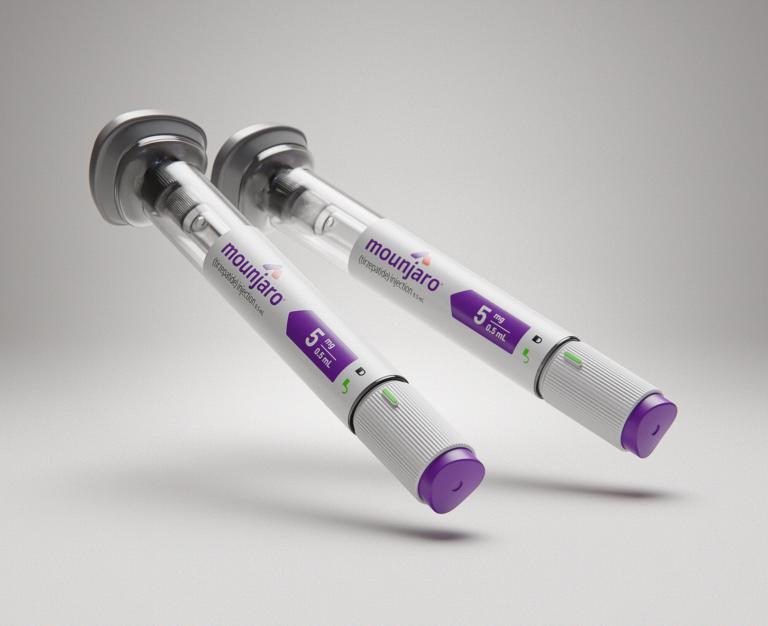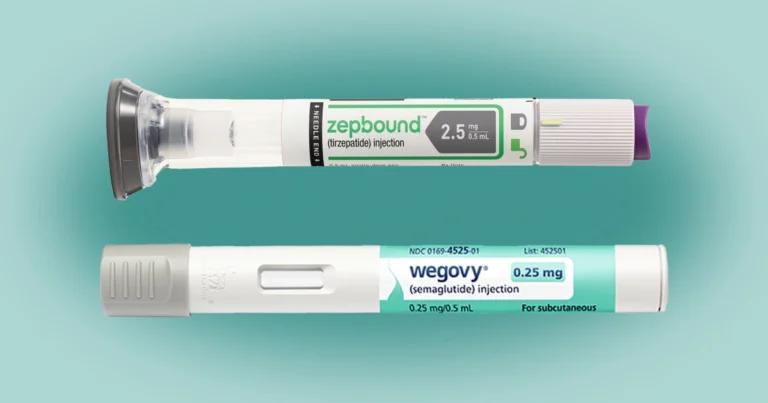In the battle against obesity and being overweight, new weight loss drugs like Zepbound, Mounjaro, Wegovy, and Ozempic are changing the landscape of treatment options. These medications offer hope for individuals struggling with excess weight and related conditions. But how do these drugs compare in terms of efficacy, cost, and overall effectiveness? Zepbound has been FDA-approved (Food and Drug Administration) in the United States, but only Mounjaro has UK MHRA (Medicines and Healthcare products Regulatory Agency) approval, so you’re only likely to find Mounjaro for sale in the UK for now.
In this comprehensive article, we will delve into the details of brand name drugs Zepbound and Mounjaro, manufactured by Eli Lilly. exploring their mechanisms of action, clinical trials, side effects, and more. By the end, you’ll have a clear understanding of these groundbreaking weight loss drugs and how they stack up against each other.
Mechanism of action
Understanding how weight loss drugs work is crucial to assess their potential effectiveness. Zepbound and Mounjaro both target specific mechanisms in the body to promote weight loss and contain the same active ingredient called tirzepatide. Zepbound activates receptors of hormones secreted from the intestine, such as glucagon-like peptide-1 (GLP-1) and glucose-dependent insulinotropic polypeptide (GIP), which reduce appetite and food intake. On the other hand, Mounjaro works by improving blood sugar levels in individuals with type 2 diabetes, which can indirectly lead to weight loss. By targeting these different pathways, both drugs aim to help individuals achieve their weight loss goals.
Clinical trials and efficacy
Clinical trials play a crucial role in determining the efficacy of weight loss drugs. Zepbound and Mounjaro have undergone rigorous testing to evaluate their effectiveness in promoting weight loss. In studies involving obese or overweight patients, both drugs demonstrated significant reductions in body weight compared to placebo. Additionally, a higher proportion of patients treated with Zepbound and Mounjaro achieved at least a 5% weight reduction, a clinically significant milestone. These promising results highlight the potential of these drugs in combating obesity.
Side effects and safety
As with any medication, it’s essential to consider the potential side effects and safety profile of Zepbound and Mounjaro. Common side effects of Zepbound include nausea, diarrhea, vomiting, constipation, and abdominal discomfort. It may also cause injection site reactions, fatigue, allergic reactions, burping, hair loss, and gastroesophageal reflux disease. On the other hand, Mounjaro may lead to symptoms such as a lump or swelling in the neck, hoarseness, trouble swallowing, or shortness of breath, which may be signs of thyroid cancer. Both drugs have specific contraindications and precautions, and it’s crucial to consult with a healthcare provider before starting treatment.
Dosage and administration
Proper dosage and administration are essential for the effective use of weight loss drugs. Zepbound is administered through subcutaneous injections once a week. The dosage must be titrated over several weeks to achieve the target dose of 5 mg, 10 mg, or 15 mg once weekly. The maximum recommended dosage is 15 mg once weekly. Similarly, Mounjaro is also administered through subcutaneous injections, typically once weekly, but the specific dosage and administration guidelines may vary. It’s crucial to follow the prescribed regimen and consult with a healthcare provider for individualized guidance.
Cost and affordability
The cost of medication is an important consideration for many individuals who seek to lose weight. The affordability of Zepbound and Mounjaro may vary depending on factors such as insurance coverage, discounts, and patient assistance programs. It’s advisable to check with insurance providers and explore available resources to determine the cost of these drugs. Additionally, discussing options with healthcare providers and exploring alternative weight loss treatments may help individuals find the most cost-effective solution that fits their budget.
Comparison of Zepbound and Mounjaro
Now that we’ve explored the individual details of Zepbound and Mounjaro, let’s compare these two weight loss drugs side by side. While both medications aim to assist with weight loss, they have distinct mechanisms of action, clinical trial results, safety profiles, and costs.
It is important to note that Zepbound is indicated for chronic weight management in adult patients with obesity with a BMI (body mass index) of 30 +, or who are overweight with a BMI of 27+ with weight-related medical health conditions. Weight-related conditions may include high blood pressure (hypertension) or high cholesterol. On the other hand, Mounjaro is a diabetes drug indicated to be used along with diet and exercise to improve blood sugar (glucose) in adults with type 2 diabetes mellitus.
Understanding these differences can help individuals make informed decisions about which drug may be more suitable for their specific needs. It’s crucial to consider factors such as existing medical conditions, medication interactions, and personal preferences when choosing between Zepbound and Mounjaro.
Zepbound: A closer look
Clinical trials and results
Zepbound has undergone extensive clinical trials to evaluate its efficacy in promoting weight loss. In these trials, patients treated with Zepbound at different dose levels experienced statistically significant reductions in body weight compared to those who received a placebo. Furthermore, a higher proportion of patients treated with Zepbound achieved at least a 5% weight reduction, a significant milestone in weight management. These positive results indicate the potential of Zepbound as an effective weight-loss medication.
Mechanism of action
Zepbound activates receptors of hormones secreted from the intestine, such as GLP-1 and GIP. By stimulating these receptors, Zepbound reduces appetite and food intake, leading to weight loss. This mechanism of action sets Zepbound apart from other weight loss drugs as it targets specific hormonal pathways involved in appetite regulation.
Side Effects and safety profile
While Zepbound is generally well-tolerated, it may cause side effects such as nausea, diarrhea, vomiting, constipation, and abdominal discomfort. Injection site reactions, fatigue, allergic reactions, burping, hair loss, and gastroesophageal reflux disease are also possible side effects. It’s important to discuss any concerns or pre-existing medical conditions with a healthcare provider before starting Zepbound.
Dosage and administration
Zepbound is administered through subcutaneous injections once a week. The dosage must be titrated over several weeks to achieve the target dose of 5 mg, 10 mg, or 15 mg once weekly. The maximum recommended dosage is 15 mg once weekly. It’s important to follow the prescribed dosage and administration guidelines a healthcare provider provides.
Cost and availability
The cost of Zepbound may vary depending on factors such as insurance coverage, discounts, and patient assistance programs. It’s advisable to check with insurance providers and explore available resources to determine the cost of Zepbound. Availability may also vary, and individuals should consult with their healthcare provider or pharmacist regarding the availability of Zepbound in their area.
Mounjaro: A closer look
Clinical trials and results
Mounjaro has been extensively studied in clinical trials to evaluate its efficacy in improving blood sugar control in individuals with type 2 diabetes. These trials have shown significant reductions in A1C levels, which indicate improved blood sugar management. Mounjaro has also been associated with weight loss in patients with or without diabetes, making it a potentially valuable option for individuals looking to address both conditions simultaneously.
Mechanism of action
Mounjaro improves blood sugar control by targeting specific pathways involved in glucose regulation. By enhancing insulin sensitivity and reducing glucose production, Mounjaro helps individuals with type 2 diabetes achieve better glycemic control and potentially experience weight loss as a secondary effect.
Side effects and safety profile
As with any medication, Mounjaro has potential side effects that individuals should be aware of. Some common side effects include nausea, diarrhea, vomiting, constipation, and abdominal discomfort. Additionally, Mounjaro has specific warnings regarding the risk of thyroid cancer and pancreatitis and the importance of regular monitoring. It’s crucial to discuss these potential side effects and safety concerns with a healthcare provider before starting Mounjaro.
Dosage and administration
Mounjaro is administered through subcutaneous injections, typically once weekly. The specific dosage and administration guidelines may vary depending on individual factors and the recommendations provided by a healthcare provider. It’s important to follow the prescribed regimen and consult a healthcare provider for personalized guidance.
Cost and availability
The cost of Mounjaro may vary depending on factors such as insurance coverage, discounts, and patient assistance programs. It’s advisable to check with insurance providers and explore available resources to determine the cost of Mounjaro. Availability may also vary, and individuals should consult with their healthcare provider or pharmacist regarding the availability of Mounjaro in their area.
Choosing the right weight loss drug
When faced with the decision of choosing between Zepbound and Mounjaro, individuals should consider several factors. These factors include their specific weight loss goals, existing medical conditions, medication interactions, and personal preferences. Consulting with a healthcare provider is crucial in determining the most suitable weight loss drug based on individual needs and circumstances. By considering these factors and seeking professional guidance, individuals can make an informed decision about the weight loss drug that aligns with their goals and overall well-being
Sources
- How does the weight loss drug Zepbound compare to Mounjaro, Wegovy and Ozempic? – UCHealth Today
- Type 2 Diabetes Treatment to Lower A1C – Mounjaro® (tirzepatide)
- FDA Approves New Medication for Chronic Weight Management – FDA
- MHRA authorises diabetes drug Mounjaro (tirzepatide) for weight management and weight loss – GOV.UK (www.gov.uk)
Medical Disclaimer
NowPatient has taken all reasonable steps to ensure that all material is factually accurate, complete, and current. However, the knowledge and experience of a qualified healthcare professional should always be sought after instead of using the information on this page. Before taking any drug, you should always speak to your doctor or another qualified healthcare provider.
The information provided here about medications is subject to change and is not meant to include all uses, precautions, warnings, directions, drug interactions, allergic reactions, or negative effects. The absence of warnings or other information for a particular medication does not imply that the medication or medication combination is appropriate for all patients or for all possible purposes.















